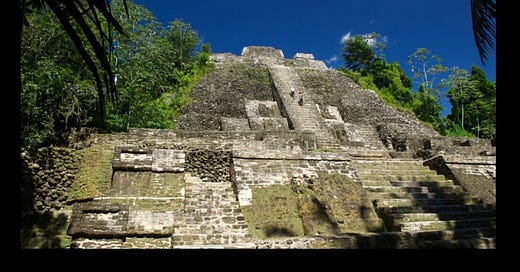God gives us his life, not ideas, doctrines, rules. At home, when all is done, life itself begins. Christ was homeless not because he despised simple happiness—he did have a childhood, family, home—but because he was at home everywhere in the world, which his Father created as the home of man.
— Father Alexander Schmemman, Journals
Over and over again, spring after spring, the questing mind, idealist and visionary, must pass through the planting to become nurturer of the real.
— Wendell Barry, The Unsettling of America
When I was in high school—forever ago—a whole group of us rascal kids from church traveled to Belize, to change the world.
In the sun, we laid cinderblock for a new school; when things cooled off a little at twilight, we played barefoot soccer under the lemon trees, then blasted ourselves with cold water under a hose and ate rice and beans and sang folk songs to Jesus as the ocean shushed and lapped along the shore until we dudes, to show how truly badass we were, fell asleep barechested on the hard floor, crawled upon all night by ants—it was paradise.
I learned a lot in Belize. My notions of wealth and poverty were evaporated in one sentence when an elderly Belizean man, smiling at all of us dumbass gringoes, remarked that “In Belize, no one is poor, because food is growing everywhere,” and then gripped a huge machete between his teeth, climbed what I remember was a very, very, very tall coconut tree, whacked a few green fruits down, then dropped to Earth himself—almost as quickly as the falling coconuts—chopped one open, and told us to drink.
That was the end of my belief that perfectly flat, weedless and also foodless, American lawns are anything but a self-inflicted desert.
And that was the end of my belief that having money was having wealth: No, having fruit trees everywhere that anybody can take from when they're hungry—having a body that can go up and down those trees—having skillful hands that can wield tools and transform Creation into sustenance, mercifully free of parasitic middlemen—that's wealth.
So twenty-six years later, at the end of my most recent essay, I suggested that
A return together to an archipelago of blossoming temple-homes—unified by a common life together in the main temple—sprawled across the Machine's worldwide oceans of asphalt and concrete—a retraction, when necessary, to quiet resting places enveloped in Edenic gardens from which we'd feed ourselves, and also our suffering neighbors, perhaps even grow our own wheat and grapes by our own human hands, transforming them into bread and wine for the Eucharist with our human hands, also, living as a deeply embodied, Earth-connected communion of love: This could already be a way of living in the age to come—as both a prophetic witness to its arrival, and perhaps also one of the means by which it does so.
Eucharistic communities could—as the rule, not the exception to the rule—be food-growing, Earth-touching communities, not just consumers of food streaming in from some mechanized Elsewhere—I think that makes sense. Also, it's just practical: The more food we grow ourselves, the less hungry we'll be when the Machine's ephemeral supply chains collapse.
In future essays, I'll explore further the gardening aspect of what I've called The Lily Archipelago—this arrangement in which life at home, life in the temple, and our life in common with the living things of Earth are unified, existing within a common field of meaning—but in this essay, I wish to zoom way, way out: To see this little project against the backdrop, not just of the recent transhumanist surge, but of the whole dawn and sunset of the West.
And it has to do with the one moment which burns most clearly in my memories of Belize:
We had scrambled up the High Temple at the Mayan ruins of Lamanai (pictured above), as the whoops of unseen howler monkeys ramified all around us—a blue day, a spacious and eternal day, just as in the picture—and, having reached the apex, we looked across the jungle, which had spiritual depth, wordless human feeling, and we sang our favorite song from there: Sing Hallelu Yah to the Lord, Sing Hallelu Yah to the Lord—the boys and the girls separately taking two different melodic paths to end up back at the same starting point, and then split off again, round and round, in a resonant circle—a simple song, for simpler times.
We thought of ourselves as rededicating the temple to the Living God, standing in the place where, eons ago, priests had sacrificed people of our age to many false ones—and so we were.
In retrospect, though, it seems we were also doing something else: We were rising through the shell of our own little notions of 'God,' letting them fall away into the silence, joining our voices with the bright birds and dark monkeys, with the trees slowly crunching the temple stones with their green—and, yes, with the ancient Mayan priests, who, after all, were children of the Earth, just as we were, and always will be.
The Death of Christianity
And it also has to do with something Jonathan Pageau said in a recent conversation with John Vervaeke, speaking of the Exodus as the departure of a polychromatic mass of Israelites and non-Israelites from a rigid way of seeing the world that had become as lifeless as the pyramids, and journeying together into the Unknown, into the indeterminate wastelands the desert, to be reintegrated at a higher level, filled with divine life once again:






